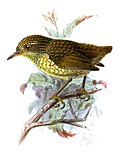Microptilotis
Appearance
| Microptilotis | |
|---|---|

| |
| Graceful honeyeater (Microptilotis gracilis) | |
| Scientific classification | |
| Domain: | Eukaryota |
| Kingdom: | Animalia |
| Phylum: | Chordata |
| Class: | Aves |
| Order: | Passeriformes |
| Family: | Meliphagidae |
| Genus: | Microptilotis Mathews, 1912 |
Microptilotis is a genus of birds in the honeyeater family Meliphagidae.
The genus was introduced in 1912 by the Australian ornithologist Gregory Mathews with the graceful honeyeater (Microptilotis gracilis) as the type species.[1] The genus name Microptilotis combines the Ancient Greek mikros meaning "small" and the genus name Ptilotis.[2]
The genus contains 10 species:[3]
- Mottle-breasted honeyeater (Microptilotis mimikae)
- Forest honeyeater (Microptilotis montanus)
- Mountain honeyeater (Microptilotis orientalis)
- Scrub honeyeater (Microptilotis albonotatus)
- Mimic honeyeater (Microptilotis analogus)
- Tagula honeyeater (Microptilotis vicina)
- Graceful honeyeater (Microptilotis gracilis)
- Cryptic honeyeater (Microptilotis imitatrix)
- Elegant honeyeater (Microptilotis cinereifrons)
- Yellow-gaped honeyeater (Microptilotis flavirictus)
The species now placed in Microptilotis were formerly placed in the genus Meliphaga. When molecular phylogenetic studies found that Meliphaga contained two distinct clades, the genus was split and many of the species transferred to the resurrected genus Microptilotis.[3][4][5]
References
[edit]- ^ Mathews, Gregory (1912). "New generic names for Australian birds". Austral Avian Record. 1 (5): 105–117 [116].
- ^ Jobling, James A. (2010). The Helm Dictionary of Scientific Bird Names. London: Christopher Helm. p. 254. ISBN 978-1-4081-2501-4.
- ^ a b Gill, Frank; Donsker, David; Rasmussen, Pamela, eds. (2020). "Honeyeaters". IOC World Bird List Version 10.1. International Ornithologists' Union. Retrieved 22 February 2020.
- ^ Andersen, M.J.; McCullough, J.M.; Friedman, N.R.; Peterson, A.T.; Moyle, R.G.; Joseph, L.; Nyári, A.S. (2019). "Ultraconserved elements resolve genus-level relationships in a major Australasian bird radiation (Aves: Meliphagidae)". Emu. 119 (3): 218–232. Bibcode:2019EmuAO.119..218A. doi:10.1080/01584197.2019.1595662. S2CID 150056949.
- ^ McCullough, J.M.; Joseph, L.; Moyle, R.G.; Andersen, M.J. (2019). "Ultraconserved elements put the final nail in the coffin of traditional use of the genus Meliphaga (Aves: Meliphagidae)". Zoologica Scripta. 48 (4): 411–418. doi:10.1111/zsc.12350.
